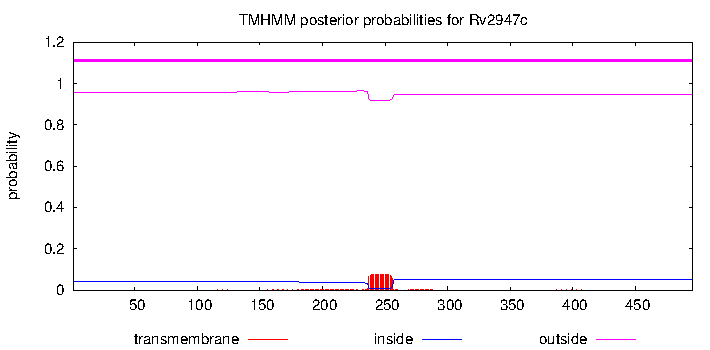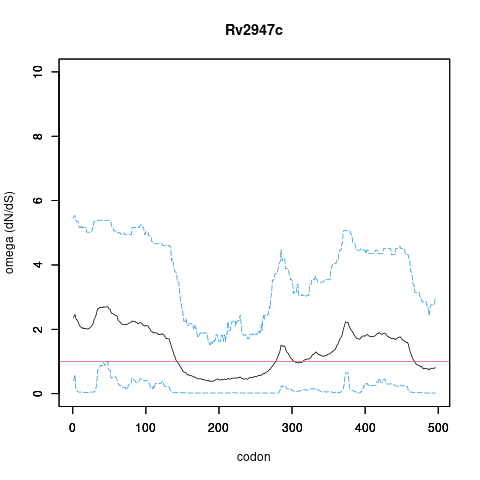| Property | Value | Creator | Evidence | PMID | Comment |
| Citation | Identification and substrate specificity of beta -ketoacyl (acyl carrier protein) synthase III (mtFabH) from Mycobacterium tuberculosis. KH. Choi, L. Kremer et al. J. Biol. Chem. 2000 | njamshidi | IDA | 10840036 | mtFABH (Rv0533c) - link between FAS I and FAS II - highest affinity for C12:0, see PMID: 10840036 (since FA synthesis is lumped, does not extend immediately to FAS II). |
| Term | EC:2.3.1.85 Fatty-acid synthase. - IDA | njamshidi | IDA | 10840036 | mtFABH (Rv0533c) - link between FAS I and FAS II - highest affinity for C12:0, see PMID: 10840036 (since FA synthesis is lumped, does not extend immediately to FAS II).
KH. Choi, L. Kremer et al. Identification and substrate specificity of beta -ketoacyl (acyl carrier protein) synthase III (mtFabH) from Mycobacterium tuberculosis. J. Biol. Chem. 2000 |
| Term | TBRXN:FAS140 fatty acid synthase (n-C14:0) - IDA | njamshidi | IDA | 10840036 | mtFABH (Rv0533c) - link between FAS I and FAS II - highest affinity for C12:0, see PMID: 10840036 (since FA synthesis is lumped, does not extend immediately to FAS II).
KH. Choi, L. Kremer et al. Identification and substrate specificity of beta -ketoacyl (acyl carrier protein) synthase III (mtFabH) from Mycobacterium tuberculosis. J. Biol. Chem. 2000 |
| Interaction | RegulatedBy Rv1221 | yamir.moreno | IEP | | Microarrays. mRNA levels of regulated element measured and compared between wild-type and trans-element mutation (knockout, over expression etc.) performed by using microarray (or macroarray) experiments..
R. Manganelli, MI. Voskuil et al. The Mycobacterium tuberculosis ECF sigma factor sigmaE: role in global gene expression and survival in macrophages. Mol. Microbiol. 2001 |
| Name | Together with Pks1, type 1 polyketide synthase involved in the elongation of p-hydroxybenzoic acid derivatives with malonyl-CoA to form p-hydroxyphenylalkanoates (precursors of phenolic glycolipids [PGL]); the pks15 and pks1 genes are fused in PGL-producing strains of M. tuberculosis but a frameshift mutation causes this polyketide synthase to be inactive in the H37Rv strain | mjackson | IMP | | Phthiocerol dimycocerosates (PDIM), phenolic glycolipids (PGL) and para-hydroxybenzoic acid derivatives |
| Other | TBPWY:Phthiocerol dimycocerosates, PGL & pHBAD | mjackson | | | Together with Pks1, type 1 polyketide synthase involved in the elongation of p-hydroxybenzoic acid derivatives with malonyl-CoA to form p-hydroxyphenylalkanoates (precursors of phenolic glycolipids [PGL]); the pks15 and pks1 genes are fused in PGL-producing strains of M. tuberculosis but a frameshift mutation causes this polyketide synthase to be inactive in the H37Rv strain (phenotypic [mycobacterial recombinant strains]).
P. Constant, E. Perez et al. Role of the pks15/1 gene in the biosynthesis of phenolglycolipids in the Mycobacterium tuberculosis complex. Evidence that all strains synthesize glycosylated p-hydroxybenzoic methyl esters and that strains devoid of phenolglycolipids harbor a frameshift mutation in the pks15/1 gene. J. Biol. Chem. 2002 |
| Citation | Role of the pks15/1 gene in the biosynthesis of phenolglycolipids in the Mycobacterium tuberculosis complex. Evidence that all strains synthesize glycosylated p-hydroxybenzoic methyl esters and that strains devoid of phenolglycolipids harbor a frameshift mutation in the pks15/1 gene. P. Constant, E. Perez et al. J. Biol. Chem. 2002 | mjackson | | 12138124 | Together with Pks1, type 1 polyketide synthase involved in the elongation of p-hydroxybenzoic acid derivatives with malonyl-CoA to form p-hydroxyphenylalkanoates (precursors of phenolic glycolipids [PGL]); the pks15 and pks1 genes are fused in PGL-producing strains of M. tuberculosis but a frameshift mutation causes this polyketide synthase to be inactive in the H37Rv strain (phenotypic [mycobacterial recombinant strains]). |
| Citation | Role of the pks15/1 gene in the biosynthesis of phenolglycolipids in the Mycobacterium tuberculosis complex. Evidence that all strains synthesize glycosylated p-hydroxybenzoic methyl esters and that strains devoid of phenolglycolipids harbor a frameshift mutation in the pks15/1 gene. P. Constant, E. Perez et al. J. Biol. Chem. 2002 | jjmcfadden | | 12138124 | Inferred from direct assay |
| Other | EC: | jjmcfadden | | | Inferred from direct assay
P. Constant, E. Perez et al. Role of the pks15/1 gene in the biosynthesis of phenolglycolipids in the Mycobacterium tuberculosis complex. Evidence that all strains synthesize glycosylated p-hydroxybenzoic methyl esters and that strains devoid of phenolglycolipids harbor a frameshift mutation in the pks15/1 gene. J. Biol. Chem. 2002 |


